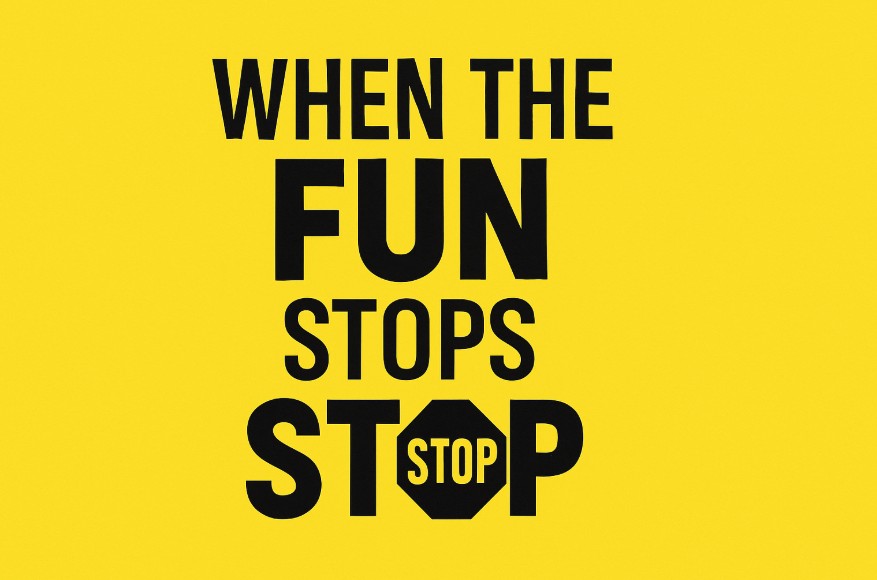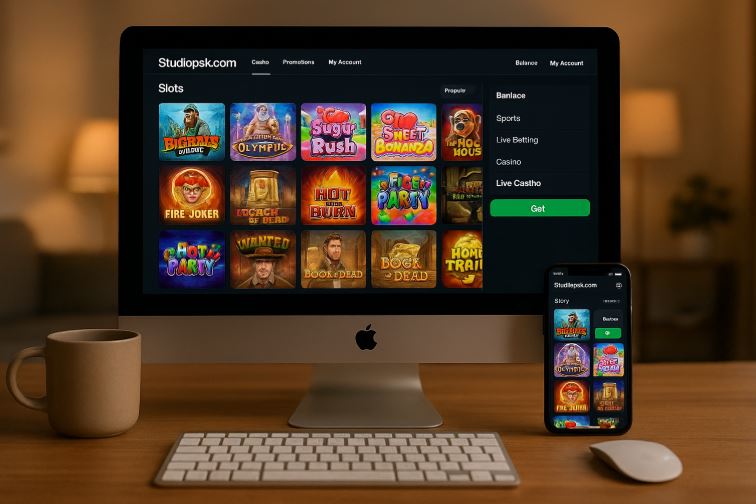When the Fun Stops, Stop?: Signs of Gambling Problem
Gambling can be an enjoyable pastime for many, but when it crosses the line into harmful behaviour, the consequences can be serious. The phrase “When the Fun Stops, Stop” serves as a crucial reminder to recognise when betting is no longer recreational.
This blog explores the meaning behind the campaign, the early signs of problem gambling, and the support available in the UK. Understanding these factors is essential for anyone concerned about maintaining responsible gambling habits.
What Does “When the Fun Stops Stop” Really Mean?

The phrase “when the fun stops stop” was introduced in the UK as part of a nationwide responsible gambling campaign initiated by the Senet Group in 2015.
Its main goal was to encourage gamblers to pause and reflect on their betting habits, and more importantly, to stop gambling when it ceases to be enjoyable.
The slogan was widely adopted by UK bookmakers and appeared across multiple advertising platforms, including TV ads, betting sites, and printed promotional materials.
Its intention was never to discourage gambling entirely, but to raise awareness around moderation, and to protect vulnerable individuals from slipping into gambling addiction.
This campaign was particularly important as it marked one of the first times the industry openly acknowledged the potential dangers of problem gambling while still advocating for safe and responsible participation.
Over time, it has become a key component of public health messaging around gambling awareness in the UK.
How to Recognise the Early Signs of Gambling Addiction?
Gambling addiction, also referred to as compulsive gambling or gambling disorder, often begins subtly.
Many individuals do not realise they have a problem until it has already caused significant financial, emotional, or social harm. Recognising the early warning signs is crucial for early intervention and reducing the long-term impact of problem gambling.
Changes in Behaviour and Routine
One of the most noticeable signs of a developing gambling problem is a shift in behaviour. These changes can manifest in both personal and professional settings and may include:
- Spending more time than usual gambling, either online or in-person
- Losing interest in hobbies or activities previously enjoyed
- Becoming increasingly isolated or withdrawn from family and friends
- Regularly discussing gambling or appearing preoccupied with betting outcomes
- Using sick days or arriving late to work due to gambling sessions
These behavioural shifts are often gradual. However, over time, gambling starts to take precedence over responsibilities, relationships, and even basic self-care.
Emotional Warning Signs
Emotional changes are common among individuals who are developing a gambling problem. These may initially be subtle but tend to become more pronounced as the addiction progresses.
Common emotional indicators include:
- Feelings of restlessness or irritability when not gambling
- Mood swings, especially after wins or losses
- Anxiety or depression stemming from financial or personal consequences
- Feelings of guilt, shame, or remorse after gambling
- A sense of euphoria during gambling that is difficult to replicate through other activities
The psychological highs and lows associated with gambling can mimic those of substance addictions. The cycle of emotional reward followed by distress creates a dependency that can be difficult to break without support.
Financial Red Flags
Financial signs are often the first tangible indicators that gambling may be becoming problematic. Unlike emotional or behavioural symptoms, financial consequences are typically easier to measure.
Key financial red flags include:
- Frequently borrowing money or taking out loans to fund gambling
- Using savings or essential household funds to place bets
- Unexplained financial shortfalls or missing assets
- Increasing reliance on credit cards or payday lenders
- Neglecting essential bills, rent, or mortgage payments
In some cases, individuals may turn to illegal activity such as fraud or theft to sustain their gambling habits. These actions are typically driven by desperation to recover losses or maintain the addiction.
Social and Relationship Strain
As gambling begins to dominate a person’s life, their social relationships often suffer. This may occur through both deliberate secrecy and unintentional emotional withdrawal.
Common social impacts include:
- Avoiding friends or family to hide gambling habits
- Arguing with loved ones about money or time spent gambling
- Breaking trust due to lies about gambling frequency or debt
- Missing family events or social obligations due to gambling priorities
Gambling-related stress can also lead to increased irritability or emotional detachment, which strains personal and professional relationships. Over time, these conflicts can lead to isolation, which further entrenches the addiction.
Denial and Minimisation
Another hallmark of early-stage gambling addiction is denial. Individuals often minimise the seriousness of their behaviour and rationalise continued gambling as harmless fun or a temporary phase.
Common patterns of denial include:
- Believing a big win will solve current problems
- Downplaying the amount of money or time spent gambling
- Comparing oneself to others who gamble more to justify behaviour
- Refusing to acknowledge emotional or financial consequences
Denial is a significant barrier to seeking help. It prevents individuals from recognising that their gambling has moved beyond entertainment and is now causing harm.
Increased Risk-Taking and Chasing Losses
As gambling becomes more compulsive, individuals may begin to take greater risks in an attempt to recover previous losses. This behaviour is known as “chasing losses” and is a critical warning sign of gambling addiction.
Risk-taking behaviours may include:
- Placing larger or riskier bets than usual
- Gambling more frequently to make up for recent losses
- Betting on unfamiliar games or sports in the hope of winning
- Ignoring betting limits or responsible gambling tools
Chasing losses rarely leads to recovery. Instead, it often results in deeper financial and emotional damage, reinforcing the cycle of addiction.
Neglect of Self-Care and Responsibilities
As gambling becomes all-consuming, individuals may begin to neglect daily responsibilities and self-care routines. This deterioration can affect several areas of life, such as:
- Skipping meals or not maintaining personal hygiene
- Ignoring household chores or parenting duties
- Failing to meet deadlines or job responsibilities
- Losing focus or motivation for everyday tasks
Neglecting these responsibilities often leads to additional stress, which further fuels the desire to gamble as an escape mechanism.
Increased Secrecy and Concealment
Many problem gamblers go to great lengths to hide their behaviour. The desire to conceal gambling habits often stems from guilt, fear of judgment, or an attempt to avoid confrontation.
Signs of secrecy may include:
- Deleting betting app history or browser searches
- Creating multiple accounts to avoid detection
- Lying about financial transactions or cash withdrawals
- Withdrawing from joint bank accounts or controlling household finances
This secrecy creates a double life, where the individual appears normal on the surface but is privately battling addiction. As the habit progresses, maintaining this facade becomes increasingly difficult and stressful.
What Are the Impacts of Problem Gambling on Daily Life?

Problem gambling affects more than just the gambler; it ripples out to impact their family, work, finances, and mental health.
One of the most common consequences is financial strain. Gamblers may accumulate debt, default on bills, or resort to borrowing money, sometimes from high-interest lenders or even through criminal activity.
In addition to the financial consequences, there are profound emotional and psychological effects. Anxiety and depression are common among those experiencing gambling problems, and in severe cases, suicidal ideation may occur.
Many individuals report feelings of shame, guilt, and hopelessness, particularly when their behaviour harms those around them.
Relationships also suffer significantly. Gambling-related secrecy, financial dishonesty, and emotional withdrawal can erode trust between partners, friends, and family members. In some cases, this leads to family breakdowns, loss of custody of children, or domestic conflict.
The table below outlines a comparison of gambling’s effects across key aspects of daily life:
| Impact Area | Recreational Gambling | Problem Gambling |
| Financial Health | Budgeted spending | Uncontrolled losses, debt accumulation |
| Mental Wellbeing | Enjoyment, no negative impact | Anxiety, depression, emotional distress |
| Social Connections | Maintained or strengthened | Withdrawal, secrecy, conflict |
| Work Performance | Unaffected or minimal distraction | Poor focus, absenteeism, job loss |
What Are the Strategies for Responsible Gambling?
Managing gambling behaviour is possible through a range of tools and practical strategies. These are particularly effective for individuals at risk of developing problematic gambling habits, as well as those looking to stay within healthy limits.
Self-assessment tools provided by platforms like GambleAware and GamCare offer an excellent starting point. These questionnaires help individuals evaluate their gambling patterns and identify potential risks.
Setting personal boundaries is crucial. This may include:
- Establishing time and money limits before gambling sessions
- Avoiding gambling when under the influence of alcohol or when feeling emotionally distressed
- Using pre-commitment tools provided by online gambling platforms
Another strategy is to monitor emotional triggers. Stress, loneliness, boredom, or financial pressure can all serve as catalysts for problematic gambling. Recognising and managing these triggers through healthier coping mechanisms such as exercise, socialising, or speaking with a therapist can reduce dependency on gambling.
Many gambling operators in the UK are required to provide built-in responsible gambling tools. These include options such as deposit limits, loss limits, time-out periods, and reality checks, which display session durations.
Self-exclusion programmes like GAMSTOP allow users to block access to UK-licensed gambling websites and apps for a set period, offering a more drastic intervention when other measures fail.
The table below presents some common tools and how they support responsible gambling:
| Tool or Strategy | Description | Benefit |
| Deposit Limits | Caps on how much can be deposited within a timeframe | Prevents overspending |
| Time-Out Periods | Temporary suspension of account access | Encourages reflection and control |
| GAMSTOP Self-Exclusion | Blocks access to all participating UK sites | Strong barrier against compulsive gambling |
| Reality Checks | Pop-up messages showing time spent gambling | Promotes time awareness |
Support Systems and Help Available in the UK

There is a strong support network for problem gamblers across the UK, backed by both government and charitable organisations. Access to support is crucial in ensuring recovery, and many of the services available are free and confidential.
GamCare is one of the most prominent services, offering a 24/7 helpline, live chat support, and one-on-one counselling sessions. They also provide online forums and self-help resources designed for individuals and affected family members.
GambleAware funds research, education, and treatment programmes across England, Scotland, and Wales. Their goal is to reduce gambling harm through public awareness campaigns and partnerships with other health providers.
NHS gambling services now include a growing number of specialist clinics that offer clinical treatment to individuals experiencing severe gambling issues. Treatments typically include cognitive behavioural therapy (CBT), which has proven effective in helping individuals change harmful behaviours.
Other forms of help include financial counselling, peer support groups, and mobile apps that track gambling activity or block gambling-related content.
Community support and open dialogue are just as critical. Family and friends can be instrumental in identifying early warning signs and encouraging individuals to seek professional help. Educating loved ones about the nature of gambling addiction helps remove stigma and fosters a supportive recovery environment.
The Role of UK Gambling Regulations in Harm Prevention
The UK’s regulatory framework for gambling is among the most developed globally. The Gambling Commission is responsible for ensuring operators meet strict criteria regarding player protection and responsible gambling.
All licensed operators in the UK must:
- Display responsible gambling messages clearly on websites and advertisements
- Provide easy access to tools such as deposit limits, time-outs, and self-exclusion
- Train customer service teams to identify and intervene when a player shows signs of distress
- Submit to audits and assessments to ensure compliance with gambling laws
The Gambling Commission also mandates operators to contribute financially to research, education, and treatment efforts aimed at reducing gambling harm.
Marketing and advertising are also closely monitored. Rules prohibit targeting vulnerable groups, such as minors or individuals with known gambling issues. Any violation of these standards can result in heavy fines, suspensions, or revocation of operating licenses.
UK regulation plays a vital role in promoting responsible gambling while holding the industry accountable for consumer safety.
Can You Gamble Safely?: Promoting Awareness and Balance

While gambling inherently carries risks, it can be approached safely and responsibly when managed correctly. Education, self-awareness, and open conversations are central to maintaining a balanced relationship with gambling.
Maintaining a healthy perspective involves:
- Treating gambling as a form of entertainment rather than a way to earn money
- Understanding the odds and probabilities involved in each game
- Avoiding risky behaviour such as gambling on credit or under stress
- Taking breaks and ensuring other life activities are not neglected
Gambling awareness campaigns like “when the fun stops stop” play a critical role in normalising the conversation around gambling behaviour. By highlighting the importance of knowing personal limits, they empower individuals to take control of their actions before harm develops.
Creating a culture where responsible gambling is the norm, not the exception, relies on cooperation between regulators, operators, health services, and the public. Everyone has a role to play in reducing the stigma and helping those at risk.
Conclusion
Gambling should be a fun, recreational activity, not a source of stress or harm. Understanding when the fun stops is crucial in maintaining control and well-being. Recognising the signs early, using available tools, and seeking help when needed can prevent long-term damage.
In the end, the power lies with the individual. Choosing to stop when gambling ceases to be enjoyable is not a sign of weakness, but a responsible and informed decision one that protects health, relationships, and financial security.
Frequently Asked Questions
What is the goal of the “When the Fun Stops Stop” campaign?
The campaign promotes responsible gambling by encouraging players to recognise when gambling is no longer enjoyable and to stop before harm occurs.
How can someone tell if they’re gambling too much?
Warning signs include constantly thinking about gambling, hiding activities, chasing losses, and experiencing financial stress or mood swings.
Are there free support services for problem gamblers in the UK?
Yes, organisations like GamCare, GambleAware, and the NHS offer free, confidential services, including helplines, online chats, and counselling.
What is self-exclusion and how does it help?
Self-exclusion lets individuals voluntarily ban themselves from gambling sites and shops, helping them break the cycle and regain control.
Can problem gambling be treated like an addiction?
Yes, it’s recognised as a behavioural addiction. Treatment options include therapy, support groups, and specialist NHS clinics.
Are gambling operators legally required to offer help?
Yes, under UK law, licensed operators must offer responsible gambling tools and provide help to users showing signs of problem behaviour.
What role do family and friends play in identifying problem gambling?
They are often the first to notice changes and can provide emotional support, help encourage treatment, and assist in creating boundaries.







